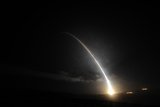Saudi agrees joint venture with French firm to boost navy
Saudi Arabia's state arms producer and a French government-majority firm signed an agreement on 17 February 2019 on a joint venture to boost the kingdom's navy, amid calls to halt weapons sales to Riyadh over its role in Yemen.
The memorandum of understanding between Saudi Arabian Military Industries (SAMI) and France's Naval Group is aimed at providing the oil-rich Gulf state's navy with ‘state-of-the-art systems’, a statement said.
‘Through design, construction, and maintenance activities, the joint venture will contribute significantly to further enhancing the capabilities and readiness of our Royal Saudi Naval Forces,’ SAMI boss Andreas Schwer said.
A spokeswoman for Naval Group - which is owned by the French state and French multinational giant Thales - refused to give any more details.
French lawmakers and rights groups have repeatedly called on France's government to suspend all arms deals to Riyadh because of the war in Yemen, where some 10,000 people have been killed since a Saudi-led coalition intervened in 2015.
Riyadh is battling on the side of the internationally recognised government against Iran-aligned Huthi rebels, in a conflict that has seen all sides accused of potential war crimes.
The US House of Representatives this week voted overwhelmingly to end American involvement in Saudi Arabia's war effort in neighbouring Yemen, dealing a rebuke to President Donald Trump and his alliance with the kingdom.
France, one of the world's biggest arms exporters, has sold equipment to Riyadh and fellow coalition member the UAE - notably Caesar artillery guns and ammunition, sniper rifles and armoured vehicles.
OPEC kingpin Saudi Arabia has been one of the world's top arms buyers for the past several years.
But in 2017, the kingdom's Public Investment Fund set up SAMI to manufacture arms locally with the fund expecting it to become one of the world's top 25 defence companies by 2030.
Naval Group - which was previously called DCNS - has been embroiled in a long-running graft scandal over the 2002 sale of two Scorpene submarines to Malaysia for $1.2 billion. The submarine maker is alleged to have paid more than €114 million ($128 million) in kickbacks to a shell company linked to a close associate of ousted Malaysian leader Najib Razak.
A French investigation launched in 2010 has already led to four French executives involved in the deal being charged. They all deny wrongdoing.
More from Naval Warfare
-
![Singapore launches fourth and final Type 218SG submarine]()
Singapore launches fourth and final Type 218SG submarine
The era of southeast Asian submarine modernisation has been in full swing fuelled by growing tensions in the South China Sea.
-
![Keel laid for third Hellenic Navy frigate as harbour trials start for first]()
Keel laid for third Hellenic Navy frigate as harbour trials start for first
On 24 March 2022, Greece and Naval Group have signed a contract for three defence and intervention (FDI) frigates. Two warships will be due for delivery in 2025 and the third expected the following year, with the deal including an option to add a fourth frigate to be ready in 2027.
-
![US senators raise Russian concerns over unprepared Coast Guard fleet]()
US senators raise Russian concerns over unprepared Coast Guard fleet
US Congress senators have warned that the US Coast Guard’s fleet cannot protect Arctic waters against Russian naval capabilities.
-
![New deal to make AUKUS cooperation easier]()
New deal to make AUKUS cooperation easier
The AUKUS agreement will support Australia’s purchase of at least eight nuclear-powered submarines under pillar one. Other pillars of the agreement cover high technology such as cyber, unmanned systems, AI, EW, undersea capabilities and information sharing between the three countries.
-
![Kongsberg contracted for Dutch and Belgian frigate propellers and drive shafts]()
Kongsberg contracted for Dutch and Belgian frigate propellers and drive shafts
In July 2023, Damen and Thales signed contracts to design, build and deliver four new anti-submarine warfare (ASW) frigates for Belgium and the Netherlands.
-
![Leonardo fires up small calibre naval gun development as Italy nears first Lionfish X-Gun handover]()
Leonardo fires up small calibre naval gun development as Italy nears first Lionfish X-Gun handover
Alongside progress on its Lionfish contracts, Leonardo emphasised its shift in focus from traditional larger calibre systems toward smaller calibre solutions, epitomised by the X-Gun’s inception in 2017.























